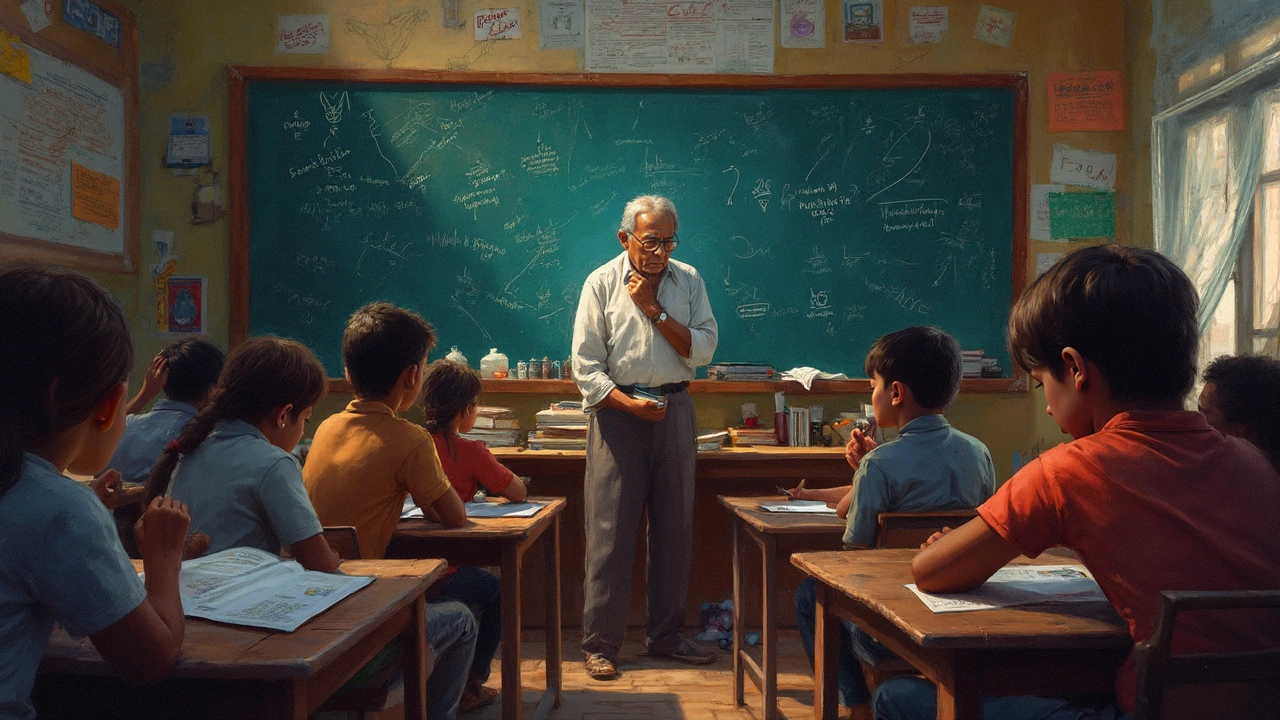Ever wondered which country takes the crown for having the toughest education system? It's a hot topic, especially when folks get talking about exam pressures, cram schools, and the parent's perennial question, "How's this gonna help my kid later?"
Let's be real; toughness isn't just about tough exams. It's about the whole package – the exam prep, the expectations, the grind behind the scenes. To really get the hang of this, think about how the curriculum, like the CBSE in India, demands not just learning but a deep understanding of a crazy range of subjects.
Sure, India stands out with its CBSE system, often dubbed one of the 'toughest' – balancing rigid schedules and an exhaustive syllabus. However, kids in places like South Korea and Singapore might argue that their systems are just as intense, with their own twists and turns.
- Global Education Systems Overview
- Defining 'Toughness' in Education
- India's CBSE Syllabus Challenge
- Contrasts with Other Countries
- Tips for Succeeding in Rigorous Systems
Global Education Systems Overview
When it comes to education around the world, it feels like each country has its own twist on how things should be done. Everyone's shooting for the stars, but they all take different paths to get there!
Take South Korea, for example. This country puts massive emphasis on being top of the class. It’s all about high stakes standardized testing—a make-or-break moment. The system is designed to push students hard, no doubt about it. The idea is that this creates a kind of academic resilience early on.
Then there's Singapore. This place is often at the top when you see global rankings for math and science. It's no accident. Singapore schools focus like a laser on getting core concepts down pat along with creative thinking.
Europe's Unique Approaches
Europe’s got its own bag of tricks, with countries like Finland doing things in reverse. They don’t pile on homework or have a test frenzy. Yet, they still churn out students who do just as well or better on international scales. Finland’s approach is all about balance and fostering a love for learning over rote memorization.
Meanwhile, in Germany, there's a strong track towards vocational training. Academic skills are important, but so is getting ready for the job market. It's like they're saying, "Hey, university isn’t for everyone, and that's okay!"
The Intense CBSE in India
In India, the big hitter here is the CBSE syllabus. It sets a high bar, with emphasis on theoretical knowledge and broad curriculum coverage. Maintaining good grades in such a demanding system requires a serious commitment.
Standout Systems
- Japan has a unique focus on respect and discipline in schools along with academic achievements.
- In Canada, there's flexibility as each province dictates its own system, often emphasizing inclusivity and bilingualism.
- The U.S. balances standardized testing with a push towards extra-curricular excellence, fostering well-rounded individuals.
It’s clear that while all these systems have their pros and cons, the most "toughest education" ultimately depends on what you’re measuring — is it the volume of information? The exam difficulty? Or perhaps, student well-being?
| Country | Education Focus |
|---|---|
| South Korea | High stakes exams |
| Singapore | Core concept mastery |
| Finland | Balanced learning |
| India | Theoretical knowledge |
Defining 'Toughness' in Education
When we dive into what makes an education system 'tough,' it's not just about hard exams or late-night study sessions. Instead, it covers a whole range of things like teaching methods, stress levels, and how much extra stuff students have to learn beyond the classroom.
What's in the Curriculum?
A big part of the education system is the curriculum itself. Some countries, like India with its CBSE syllabus, require students to master a diverse mix of subjects. Others might have a narrow focus but expect total expertise. Either way, there's a lot on the students' plates.
Teaching Styles
Teaching methods play a critical role too. In some places, rote learning is common, requiring students to memorize tons of information. In contrast, other systems emphasize conceptual understanding, which can be equally daunting but in different ways.
Assessment Pressure
Exams are the big bad here. They're high stakes, often deciding a student's future. Countries like South Korea are famous for their intense college entrance exams, sometimes even more stressful than the CBSE syllabus challenges.
Expectations from Students
The pressure to perform is universal. But how that pressure manifests varies. Students might face long hours at hagwons (after-school tutoring centers in South Korea) or dive into vast textbooks like those of the CBSE.
| Country | Study Hours Per Week | Extra-curricular Activities |
|---|---|---|
| India (CBSE) | 35-40 | Moderate |
| South Korea | 50+ | Minimal |
| Finland | 20-25 | High |
So, an education system's 'toughness' isn't just about the load. It's about balance (or sometimes the lack of it) between studying, expectations, and life outside school. Whether you're under the heaps of the CBSE syllabus or packing your schedule with hagwon classes, the challenge is real, and it's vast.

India's CBSE Syllabus Challenge
Alright, let's get into the nitty-gritty of India's CBSE system – a beast of its own. If you're part of the CBSE crowd, you know it's not just about acing a few exams. It's digging deep into a syllabus that's demanding, broad, and often quite the mental marathon.
The Rigorous Curriculum
The CBSE syllabus isn't just hefty; it's detailed. With subjects ranging from the sciences to the arts, students have to cover extensive ground. Mathematics and Sciences are particularly challenging, pushing students to not just understand concepts but apply them in tricky, real-world problems.
High Stakes, High Pressure
Exams under CBSE aren't a walk in the park. They demand a thorough grasp of subjects. It's not uncommon for students to spend long hours hitting the books, all to secure those crucial grades that could make or break their college applications.
Navigating the Challenge
- Structured Study: Keeping a well-organized study schedule helps manage the overwhelming syllabus.
- Previous Papers: Going through past exam papers can give great insights into what to expect.
- Concept Clarity: Instead of rote learning, understanding concepts is key. This is particularly true for Mathematics and Sciences where application is everything.
Recent stats show how each year over a million students take the CBSE exams, indicating its vast reach. And while it's a challenging grind, it also fosters comprehensive education that many believe equips students well for the future.
Contrasts with Other Countries
The education system can vary wildly from one place to another, and when we talk about the most demanding ones, India's CBSE often pops up alongside other heavy hitters like in South Korea and Finland. But how exactly do they stack up against each other?
South Korea: The Pressure Cooker
South Korea is known for its incredibly high academic standards. Students there undergo long school days followed by after-school academies, or 'hagwons'. The focus on exams is intense, with the Suneung – the college entrance test – being a pivotal moment in a student’s life.
"The South Korean education system is synonymous with rigorous standards and a relentless pursuit for academic excellence," says EducAsia, a renowned education think tank.
It's a tough ride, no doubt, mirrored in their suicide rates, unfortunately. But for many, it's simply seen as a necessary path to success.
Finland: A Breath of Fresh Air?
On the flip side, Finland often takes a different approach. With fewer school hours and an emphasis on holistic learning, Finnish students enjoy a less stressful academic environment. The focus is less on exams and more on understanding and creativity.
However, this doesn't mean it's a breeze. The subtle expectation is for students to be internally motivated and driven by curiosity rather than external pressures, which can actually be a different kind of challenge.
India's CBSE vs. The World
The CBSE syllabus in India is notorious for its extensive and diverse subjects. Students are expected to joggle a wide range of topics, right from sciences to language arts, and that's no small feat!
While some say it prepares students well for diverse fields, others argue it prioritizes information over creativity.
| Country | Focus | Strength |
|---|---|---|
| India | High Volume Curriculum | Versatility |
| South Korea | Exam Intensity | Precision |
| Finland | Holistic Learning | Innovation |
Each system has its strengths and pitfalls, and what works in one part of the world may not necessarily translate directly to another. What stands out is the diversity in defining what 'tough' really means.

Tips for Succeeding in Rigorous Systems
Navigating a challenging education system can feel like an uphill battle. Whether you're dealing with the demanding CBSE syllabus in India or the academic pressure in South Korea, here are a few tried-and-tested tips to make the journey smoother.
1. Smart Time Management
It's not just about studying harder but smarter. Keep a schedule that maps out your study sessions, breaks, and leisure activities. A clear visual of what your day looks like can prevent burnout and help you stay on track.
2. Active Learning Techniques
Active learning trumps passive reading every time. Techniques such as summarizing information in your own words, teaching concepts to a friend, or making colorful mind maps can make a world of difference.
3. Stress Management
Between assignments, tests, and projects, stress can build up. Regular exercise, meditation, or even short breaks to recharge can ease the stress, making it easier to handle the workload.
4. Seeking Help and Collaborating
Don’t hesitate to ask teachers for help or join study groups. Sometimes peers can offer explanations that make tricky concepts click. Plus, discussing topics with others can deepen your understanding.
5. Balance and Enjoyment
While studies are crucial, maintaining balance is key. Make time for hobbies and activities you love. Remember, education is part of life, not all of it.
Education systems differ, but with the right strategies, you can tackle even the toughest ones effectively. Keep these tips in mind, and don't forget to celebrate your small victories along the way!
